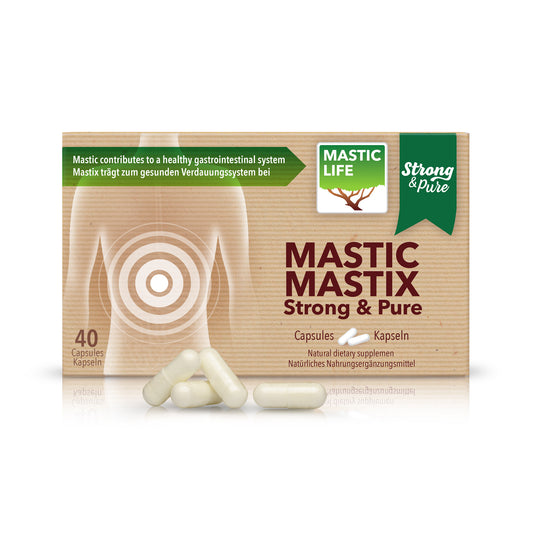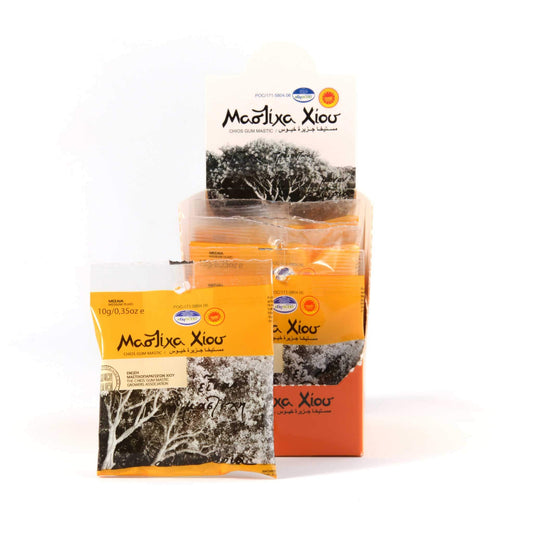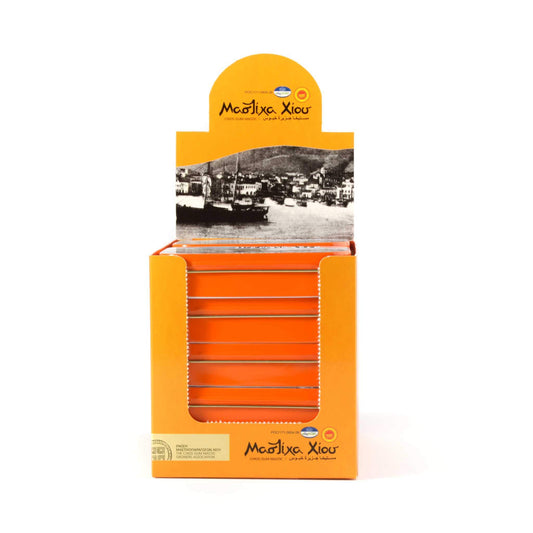Studies: GASTRO-INTESTINAL ACTIVITY OF CHIOS MASTIC
The healing properties of Chios mastic gum for the digestive system have been known since ancient times. It has been used to treat conditions such as:
- stomach pain (gastralgia)
- digestive ulcers
Physicians and historical pharmaceutical documents have referenced Chios mastic as an effective remedy for digestive disorders. For centuries, it has also been used in Arab countries as a breath freshener, a food and drink ingredient, and by traditional healers for upper abdominal discomfort. Modern scientific research began at universities in the region and has expanded significantly since the 1990s, producing many studies confirming its benefits for digestive health.
Study 1 – Chios Mastic for Duodenal Ulcer Relief
In 1984, a double-blind clinical trial with 38 patients suffering from duodenal ulcers compared Chios mastic (1g/day, 20 patients) with a placebo (1g/day lactose, 18 patients) for 2 weeks. 80% of patients taking mastic reported symptom relief compared to 50% on placebo. Endoscopic healing was observed in 70% of the mastic group versus 22% of the placebo group. No side effects were reported, confirming Chios mastic’s ulcer-healing properties.
Study 2 – Anti-Ulcer Activity of Chios Mastic in Rats
Al-Said et al. (1984) studied Chios mastic’s effect on gastric and duodenal ulcers in rats. Orally ingested at 500mg/kg, it significantly reduced gastric mucosal damage, lowered free acidity, and showed protective effects, which were absent when administered intraperitoneally.
Study 3 – Chios Mastic Reduces Drug-Induced Ulcer Risk
Gabr (1997) examined Chios mastic combined with indomethacin in rats. The combination delayed drug dissolution, sustained absorption, and reduced indomethacin-induced ulceration.
Study 4 – Chios Mastic Kills Helicobacter pylori
Huwez et al. (1998) tested Chios mastic against H. pylori strains. Mastic effectively killed H. pylori and caused structural changes to the bacteria, explaining its anti-ulcer effects.
Study 5 – Bactericidal Effect of Chios Mastic Against H. pylori
Marone et al. (2001) confirmed Chios mastic’s bactericidal effect against H. pylori, with 50% of strains killed at 125μg/ml and 90% at 500μg/ml.
Study 6 – Chios Mastic Shows Strong Antibacterial Activity
Bona et al. (2001) found that Chios mastic killed 50% of clinically isolated H. pylori strains at 125μg/ml, showing strong antibacterial activity.
Study 7 – Chios Mastic Improves H. pylori-Infected Gastritis
Roe et al. (2003) conducted a 90-day trial with H. pylori-infected patients and found that Chios mastic improved gastritis symptoms.
Study 8 – Protective Effects Against NSAID-Induced Gut Damage
Heo et al. (2006) showed that Chios mastic oil protected rats from gut damage and bacterial translocation caused by diclofenac.
Study 9 – Anti-H. pylori Activity of Chios Mastic Extracts
Paraschos et al. (2007) tested Chios mastic extracts against H. pylori in mice and in vitro. The acidic fraction and isomasticadienolic acid were the most effective at reducing bacterial colonization.
Study 10 – Anti-Inflammatory Effects in Crohn’s Disease
Kaliora et al. (2007) showed that Chios mastic reduced inflammation markers in patients with active Crohn’s disease.
Study 11 – Immune Modulation by Chios Mastic in Crohn’s Patients
Chios mastic modulates immune responses in Crohn’s patients, inhibiting TNF-alpha and affecting macrophage activity.
Study 12 – Arabinogalactan Proteins from Chios Mastic Inhibit H. pylori
Kottakis et al. (2008) found that arabinogalactan proteins from Chios mastic inhibit H. pylori growth and induce morphological changes in the bacteria.
Study 13 – Chios Mastic Inhibits Neutrophil Activation
In 2009, Chios mastic was shown to inhibit neutrophil activation in H. pylori-infected patients, helping to protect the gastric mucosa.
Study 14 – Chios Mastic Inhibits Intestinal Enzymes
Hassan (2009) showed that Chios mastic has strong inhibitory effects on intestinal enzymes like invertase, maltase, and lactase.
Study 15 – Clinical Evidence for H. pylori Eradication
Dabos et al. (2010) confirmed Chios mastic’s bactericidal effect on H. pylori in patients, with good tolerance and no side effects.
Study 16 – Functional Dyspepsia Symptom Improvement
Another study by Dabos et al. (2010) showed that Chios mastic improved symptoms in patients with functional dyspepsia, including stomach pain and heartburn.
Study 17 – Anti-Inflammatory Effects in Experimental Colitis
Gioxari et al. (2011) found that Chios mastic reduced inflammatory cytokines in rats with induced colitis, suggesting potential benefits for Crohn’s disease.
Study 18 – Support for H. pylori Eradication Therapy
Kountouras et al. (2012) indicated that Chios mastic may support H. pylori eradication therapy and play a role in gastric and colon cancer prevention.
Study 19 – Reduction of Colon Inflammation via NF-κB Pathway
Papalois et al. (2012) found that Chios mastic and its fractions reduced inflammation in experimental colitis and regulated NF-κB signaling in human colon cells. Inulin had no effect.
Study 20 – Anti-H. pylori Compounds in Mastic Essential Oil
Miyamoto et al. (2014) identified α-terpineol and (e)-methyl isoeugenol in Chios mastic essential oil as the main compounds active against drug-resistant H. pylori.
Study 21 – Anti-Inflammatory and Prebiotic Effects in IBD
Clinical trials in IBD patients demonstrated that mastic supplements can reduce inflammatory markers, showing anti-inflammatory and prebiotic effects.

FAQ – Chios Mastic and Digestive Health
Can Chios mastic help with stomach ulcers?
Yes. Clinical studies have shown that Chios mastic can relieve symptoms and promote healing in patients with duodenal and gastric ulcers, without significant side effects.
Does Chios mastic work against Helicobacter pylori?
Yes. Multiple studies demonstrate that Chios mastic has antibacterial activity against H. pylori, including drug-resistant strains, and may help reduce bacterial colonization in the stomach.
Can Chios mastic improve digestive discomfort and functional dyspepsia?
Yes. Clinical trials indicate that Chios mastic can improve symptoms such as stomach pain, heartburn, and upper abdominal discomfort in people with functional dyspepsia and other digestive issues.
Mastic for your gastrointestinal tract
-
Mastic Strong&Pure (40 Capsules) Masticlife
Regular price $19.00 USDRegular priceUnit price / per -
Mastic Strong&Pure Economy Pack (240 Capsules) Masticlife
Regular price $103.00 USDRegular priceUnit price / per -
Mastic Chios Raw Tears Medium Size 10 g
Regular price From $6.00 USDRegular priceUnit price / per$60.00 USDSale price From $6.00 USDSale -
Mastic Chios Raw Tears Medium Size 20 g
Regular price From $12.00 USDRegular priceUnit price / per$120.00 USDSale price From $12.00 USDSale




